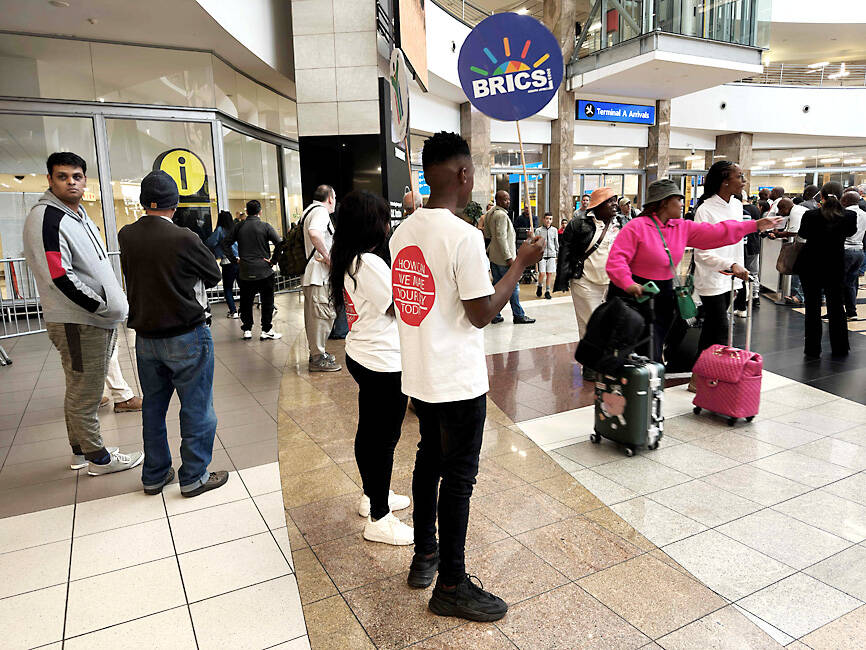An expansion of the BRICS bloc comprising Brazil, Russia, India, China and South Africa under consideration at a summit this week has attracted a motley crew of potential candidates — from Iran to Argentina — with one thing in common: a desire to level a global playing field many consider rigged against them.
The list of grievances is long. Abusive trade practices. Punishing sanctions regimes. Perceived neglect of the development needs of poorer nations. The wealthy West’s domination of international bodies, such as the UN, the IMF or the World Bank.
Amid widespread dissatisfaction with the prevailing world order, the pledge of BRICS nations to make the grouping a leading champion of the “Global South” has, despite a dearth of concrete results, found resonance.

Photo: AFP
More than 40 countries have expressed interest in joining BRICS, said officials from South Africa, which is hosting the summit from today until Thursday.
Nearly two dozen have formally asked to be admitted, they said.
“The objective necessity for a grouping like BRICS has never been larger,” said former South African minister of trade Rob Davies, who helped usher his country into the bloc in 2010. “The multilateral bodies are not places where we can go and have an equitable, inclusive outcome.”
However, observers point to an underwhelming track record which they say does not bode well for BRICS’ prospects of delivering on the lofty hopes of prospective members.
Although home to about 40 percent of the world’s population and a quarter of global GDP, the bloc’s ambitions of becoming a global political and economic player have long been thwarted by internal divisions and a lack of coherent vision.
Its once booming economies, notably heavyweight China, are slowing. Founding member, Russia, is facing isolation over the Ukraine war. Russian President Vladimir Putin, wanted under an international arrest warrant for alleged war crimes, will not travel to Johannesburg and only join virtually.
“They may have overinflated expectations of what BRICS membership will actually deliver in practice,” said Steven Gruzd from the South African Institute of International Affairs.
While BRICS has not divulged a full list of expansion candidates, a number of governments have publicly stated their interest.
Iran and Venezuela, punished and ostracized by sanctions, are seeking to reduce their isolation and hope the bloc can offer relief to their crippled economies.
“Other integration frameworks existing on a global level are blinded by the hegemonic vision pushed by the US government,” former Venezuelan central bank governor Ramon Lobo said.
Gulf states Saudi Arabia and the United Arab Emirates see BRICS as a vehicle for a more prominent role within global bodies, analysts said.
African candidates Ethiopia and Nigeria are drawn by the bloc’s commitment to reforms at the UN that would give the continent a more powerful voice. Others want changes at the WTO, IMF and World Bank.
“Argentina has insistently called for a reconfiguration of the international financial architecture,” an Argentine government official involved in the negotiations to join BRICS said.

Drug lord Jose Adolfo Macias Villamar, alias “Fito,” was Ecuador’s most-wanted fugitive before his arrest on Wednesday, more than a year after he escaped prison from where he commanded the country’s leading criminal gang. The former taxi driver turned crime boss became the prime target of law enforcement early last year after escaping from a prison in the southwestern port of Guayaquil. Ecuadoran President Daniel Noboa’s government released “wanted” posters with images of his face and offered US$1 million for information leading to his capture. In a country plagued by crime, members of Fito’s gang, Los Choneros, have responded with violence, using car

Two former Chilean ministers are among four candidates competing this weekend for the presidential nomination of the left ahead of November elections dominated by rising levels of violent crime. More than 15 million voters are eligible to choose today between former minister of labor Jeannette Jara, former minister of the interior Carolina Toha and two members of parliament, Gonzalo Winter and Jaime Mulet, to represent the left against a resurgent right. The primary is open to members of the parties within Chilean President Gabriel Boric’s ruling left-wing coalition and other voters who are not affiliated with specific parties. A recent poll by the

TENSIONS HIGH: For more than half a year, students have organized protests around the country, while the Serbian presaident said they are part of a foreign plot About 140,000 protesters rallied in Belgrade, the largest turnout over the past few months, as student-led demonstrations mount pressure on the populist government to call early elections. The rally was one of the largest in more than half a year student-led actions, which began in November last year after the roof of a train station collapsed in the northern city of Novi Sad, killing 16 people — a tragedy widely blamed on entrenched corruption. On Saturday, a sea of protesters filled Belgrade’s largest square and poured into several surrounding streets. The independent protest monitor Archive of Public Gatherings estimated the

Irish-language rap group Kneecap on Saturday gave an impassioned performance for tens of thousands of fans at the Glastonbury Festival despite criticism by British politicians and a terror charge for one of the trio. Liam Og O hAnnaidh, who performs under the stage name Mo Chara, has been charged under the UK’s Terrorism Act with supporting a proscribed organization for allegedly waving a Hezbollah flag at a concert in London in November last year. The rapper, who was charged under the anglicized version of his name, Liam O’Hanna, is on unconditional bail before a further court hearing in August. “Glastonbury,